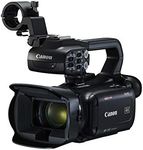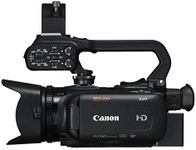We Use CookiesWe use cookies to enhance the security, performance,
functionality and for analytical and promotional activities. By continuing to browse this site you
are agreeing to our privacy policy
Best Canon Camcorders
From leading brands and best sellers available on the web.#2
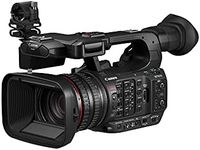
Canon
Canon XF605 4K UHD Pro Camcorder
View Product
#3
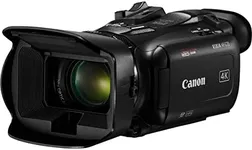
Canon
Canon 4K Camcorder VIXIA HF G70
View Product
#4
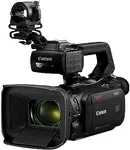
Canon
Canon XA70 Pro Camcorder 1” 4K UHD CMOS Sensor, Dual-Pixel CMOS AF, 15x Optical Zoom, 600x Digital Zoom, Image Stabilization, HDMI, USB Live Streaming, Time Stamp On-Screen Disp. Recording, XLR inputs
View Product
#5

Canon
XA65
View Product
#6
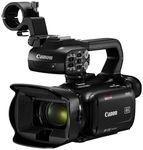
Canon
Canon XA60 PAL Professional Camcorder
View Product
#7
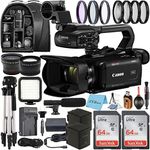
(ZT) Canon
Canon XA65 Professional UHD 4K Camcorder with 2 Pack SanDisk 64GB Memory Card + Case + Tripod + Wideangle Lens + LED Flash + Microphone + Filter Kit + ZeeTech Accessory Bundle
View Product
#8
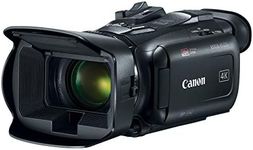
Canon
Canon 3667C002 VIXIA HF G50, Black
View Product
#9

Canon
Canon VIXIA HF G40 Full HD Camcorder
View Product
#10
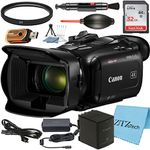
(ZT)-Canon intl
Canon Vixia HF G70 UHD 4K Camcorder with SanDisk 32GB Memory Card + UV Fliter + ZeeTech Accessory Bundle
View Product
Buying Guide for the Best Canon Camcorders
Choosing the right camcorder can make a big difference in how you capture and enjoy your memories or create content. When shopping for a camcorder, it's important to think about what you'll be using it for—whether it's family events, travel, vlogging, or more professional projects. Understanding the key features will help you find a model that matches your needs and makes recording easy and enjoyable.Sensor SizeThe sensor is the part of the camcorder that captures light and turns it into an image. A larger sensor generally means better image quality, especially in low light, and more background blur for a professional look. Small sensors are common in basic camcorders and are fine for casual use, while larger sensors are found in more advanced models and are better for those who want higher quality or plan to shoot in challenging lighting. Think about where and when you'll be filming—if you often shoot indoors or in the evening, a larger sensor can be a big advantage.
Optical ZoomOptical zoom lets you get closer to your subject without losing image quality, unlike digital zoom which can make the picture look grainy. Camcorders offer different levels of optical zoom, usually measured as a number like 10x, 20x, or even higher. Lower zoom levels are fine for filming nearby subjects, while higher zoom is useful for sports, wildlife, or events where you can't get close. Consider what you'll be filming most often to decide how much zoom you need.
Image StabilizationImage stabilization helps reduce the shakiness that can happen when you hold the camcorder in your hands, making your videos look smoother and more professional. Some camcorders have basic stabilization, while others offer advanced systems that work well even when you're walking or zoomed in. If you plan to film while moving or without a tripod, look for strong image stabilization to keep your footage steady.
Video ResolutionVideo resolution refers to how clear and detailed your videos will look. Common options include Full HD (1080p) and 4K. Full HD is good for most everyday uses and is easy to share and edit, while 4K offers much more detail and is better for large screens or future-proofing your videos. If you want the sharpest image or plan to edit your videos heavily, 4K is a good choice, but for simple family videos, Full HD is usually enough.
Audio FeaturesGood sound is just as important as good video. Some camcorders have built-in microphones that work well for casual use, while others let you connect an external microphone for better audio quality. If you plan to record interviews, events, or anything where clear sound matters, look for a camcorder with a microphone input or advanced audio controls.
Manual ControlsManual controls let you adjust settings like focus, exposure, and white balance yourself, giving you more creative control over your videos. Basic camcorders often handle these settings automatically, which is fine for quick and easy shooting. If you want to experiment with different looks or shoot in tricky lighting, manual controls can be very helpful.
Battery LifeBattery life determines how long you can record before needing to recharge or swap batteries. Some camcorders last for hours, while others may need more frequent charging. If you plan to film long events or travel without easy access to power, look for a model with longer battery life or the option to use spare batteries.
Size and WeightThe size and weight of a camcorder affect how easy it is to carry and use. Smaller, lighter camcorders are great for travel and casual use, while larger models may offer more features but can be heavier to hold for long periods. Think about how and where you'll use your camcorder—if you want something you can take anywhere, a compact model is best, but if you need advanced features, a larger camcorder might be worth it.



